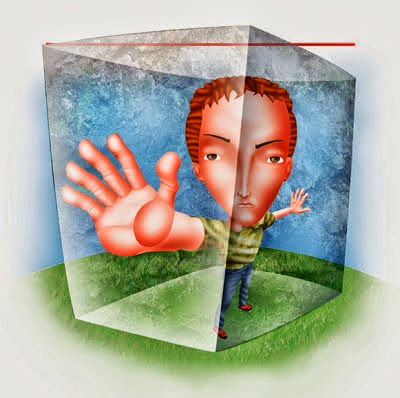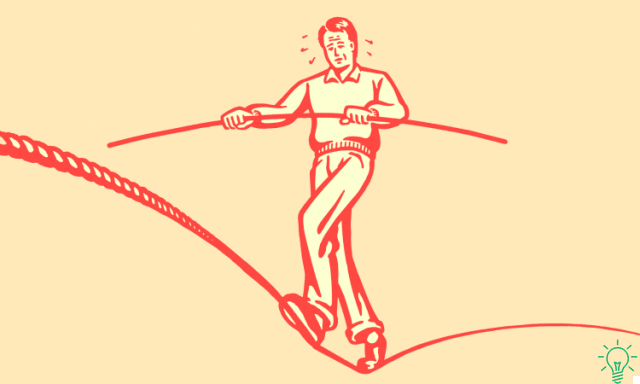
Anxiety is a voice in your head that tells you, "something bad is about to happen." It is a state of activation and expectation due to the feeling of widespread but imminent danger. Sometimes it's easy to recognize anxiety because it generates panic attacks, prevents you from thinking clearly, makes your hands sweat, and causes palpitations, but that's not always the case. There is also "high functioning anxiety," a type of anxiety that can also help you be more effective than average, but ends up paying a high price.
What is High-Functioning Anxiety?
High-functioning anxiety is not a clinical disorder, but the problems it generates can become chronic and debilitating. People with high functioning anxiety experience many symptoms typical of anxiety disorders but do not meet the criteria for diagnosis, although their quality of life can be significantly affected.
In other words, the tension and stress they feel aren't severe enough to affect their lives noticeably. In fact, people with high functioning anxiety tend to keep it hidden and are often perceived as effective, capable and strong, but on the inside they face enormous anxiety.
This type of anxiety becomes a kind of fuel that keeps them active and gives them the feeling of being able to do everything, but in the long run it is a dangerous fuel because it will eventually run out of energy, both psychologically and physically.
10 symptoms of high functioning anxiety
- You are always prepared. In any situation, your mind is always contemplating the worst possible scenario. Other people may see the more positive part, but you automatically see problems, risks and dangers. Consequently, take all possible precautions to prepare for those scenarios. The people around you will see you as a reliable and proactive person, but they don't suspect that continually preparing for worst-case scenarios generates such exhausting anxiety.
- You have to constantly make sure. If you suffer from high-functioning anxiety, you will need to check things over and over again, bordering on obsession. Since you're always imagining the worst-case scenarios, you need to make sure you're ready to deal with them, so go over all the points more than once to make sure everything is in order. Obviously, this obsession with control makes you waste precious time and energy.
- Convey a confident image. Most people with high functioning anxiety don't reveal how nervous they feel, they are adept at keeping their anxiety a secret. It is possible that they have learned from childhood to suppress emotions and project a serene and stoic image, so they process everything within them.
- See the world differently. Anxiety isn't just "in your head". A study conducted at Israel's Weizmann Institute of Science found that anxious people perceive the world differently. In practice, it is more difficult for them to distinguish between a safe stimulus and a threat. As a result, they tend to see the world more threatening, which increases anxiety.
- You feel the need to always do something. High-functioning anxiety is characterized by a state of constant activity. This does not mean that you are a hyperactive person, but that you have a hard time spending time alone with yourself. When you have free time, you get the feeling that you should do something productive or use it in some activity that keeps you entertained, to distract you from anxiety. The problem is that this state of overstimulation fuels anxiety because it prevents you from relaxing.
- You are successful in many of your projects. High-functioning anxiety leads you to plan, anticipate possible problems, organize all the details, and always keep yourself active. Therefore, others are likely to perceive you as a successful person and ask you, even with admiration, how you can do so many things at once. The problem is that it's never enough for you, you have to do more and more because those activities allow you to distract yourself from anxiety and escape ruminating thoughts.
- You built your life around escapism. People with high functioning anxiety often build their lives around familiar routines and experiences that give them the feeling of control. They prefer to stay in their comfort zone and avoid intense emotional experiences that can accentuate anxiety. When a situation causes them anxiety, they prefer to avoid it if possible, so they tend to be big procrastinators. The problem is, these pending tasks tend to generate even more anxiety.
- You have a propensity to resort to negative thoughts. Your mind is always active, maintaining an internal dialogue often characterized by all kinds of negative thoughts. You are likely to repeat past mistakes over and over, even if you know you can't fix them. You usually spend a lot of time thinking “what if…” As always you're expecting the worst, you can't enjoy the present. Sometimes it's like your mind has a life of its own and you feel like you can't control it, which makes you even more anxious.
- You are a perfectionist. You try to calm your worries by trying to make your job or appearance perfect. Undoubtedly, this can allow you to reap a lot of hits, but it comes at a price. Behind perfectionism there is often an “all or nothing” mentality that makes you waste time and energy. You are likely to have unrealistic expectations of yourself and fear that you won't be able to fulfill them, not be able enough to meet your standards.
- You try too hard not to let others down. High-functioning anxiety is also caused by a desire to make those around you happy and try to meet their needs, often at the expense of yours.
The consequences of high functioning anxiety
This constant state of anxiety often generates various problems, both psychological and physical.
- Pain, tics or physical discomfort. Anxiety usually manifests itself physically, so you are likely to suffer from muscle strain which will eventually turn into pain. It is also possible that you suffer from tics or develop dermatological or gastrointestinal problems. The physical expression of anxiety will depend on your target organs.
- You're always exhausted. Your mind is always on, so you have a hard time falling asleep or resting. Even when you sleep well, the next day you feel tired, because dealing with anxiety is simply exhausting.
- You get angry easily. As a result of the constant tension, any stimulus, no matter how small, can scare you. A sudden noise can make you jump, because your nervous system is in a state of hyper-arousal. Sometimes you are also likely to react by becoming excessively irritated in your interpersonal relationships due to the stress you feel.



























